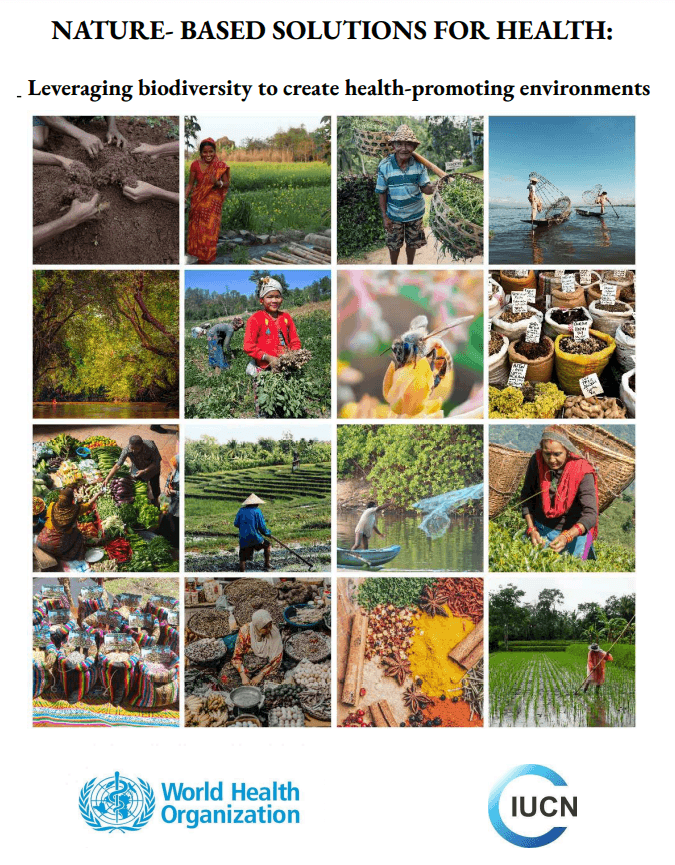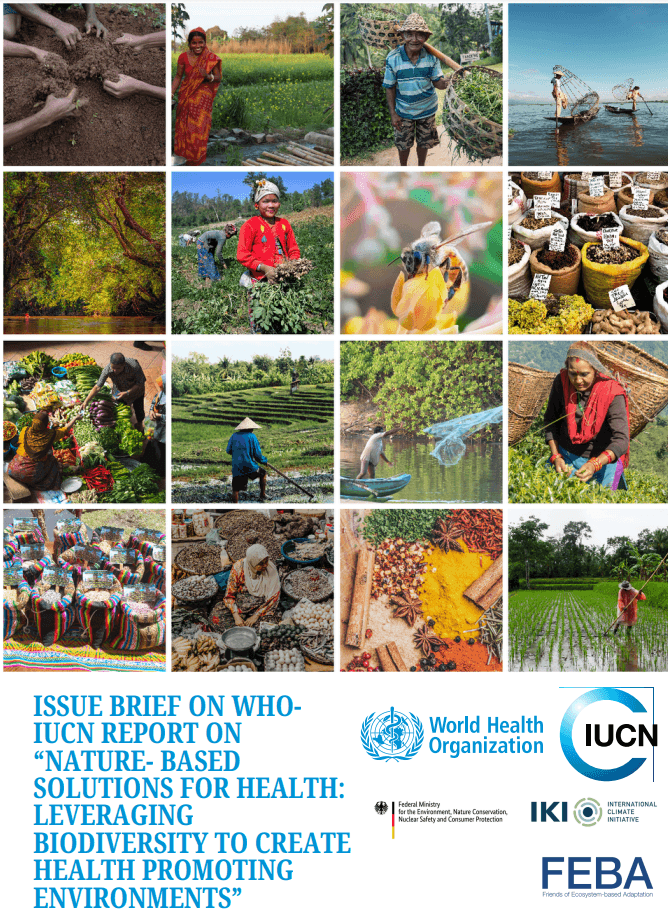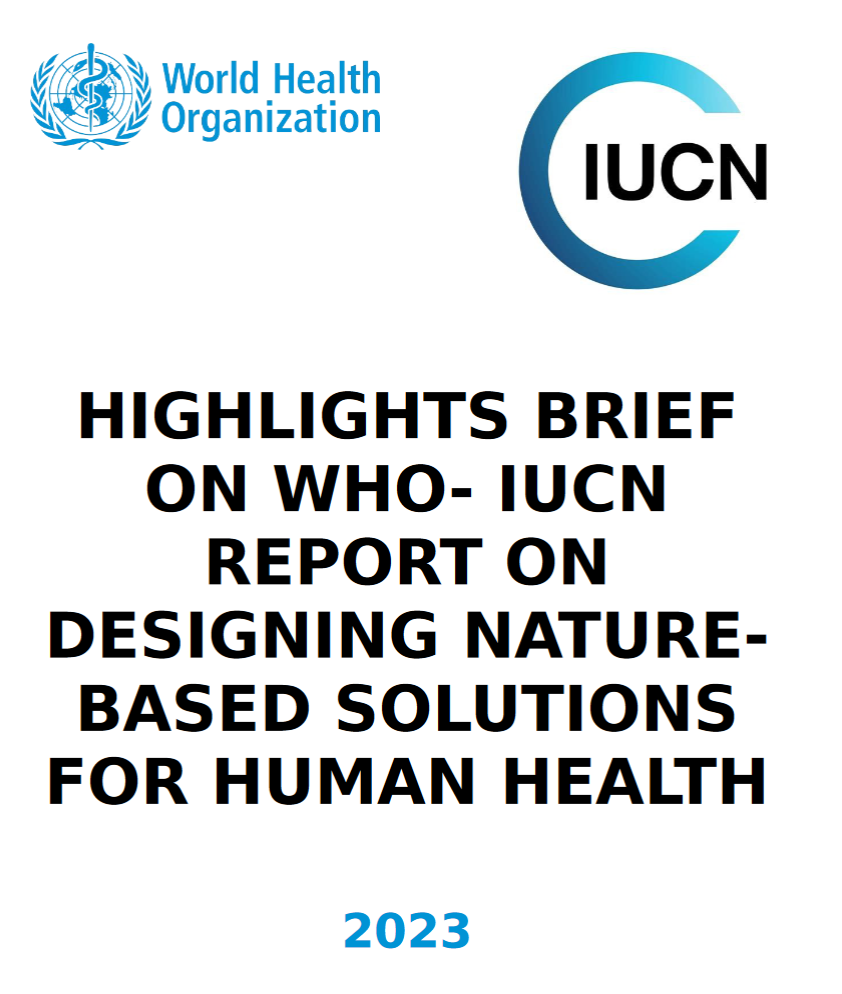Biodiversity, Climate, One Health and Nature-based Solutions
Chaired By


Under the umbrella of the Friends of EbA (FEBA) network, leading experts engaged in the science-policy interface of public health, biodiversity, and climate change will collaborate in an innovative initiative led by the WHO and IUCN to help guide decision makers toward a healthier, greener and more sustainable future as they navigate the challenges of the post-COVID-19 era.
The World Health Organization (WHO), through its Department of Environment, Climate Change and Health (ECH), the International Union for Conservation of Nature (IUCN), and the Friends of Ecosystem-based Adaptation (FEBA) network are establishing a new expert working group (EWG) on Biodiversity, Climate, One Health and Nature-based Solutions. This initiative builds upon and expands the scope of work carried out by the Inter-agency Liaison Group on biodiversity and health, co-chaired by WHO and the Convention on Biological Diversity between 2015 and 2020.
The EWG will develop guidance and tools to support the operationalization of One Health approaches and Nature-based Solutions by: (1) identifying co-benefits and trade-offs for human and ecosystem health, (2) strengthening social and ecological resilience and (3) supporting a healthy, green and just recovery from COVID-19.
Read more about the EWG launch here and here.
Listed below are current members of the Expert Working Group:
Diarmid Campbell-Lendrum (WHO), Marina Maiero (WHO), Maria Neira (WHO), Cristina Romanelli (WHO), Ali Raza Rizvi (IUCN), Gregory Davies-Jones (IUCN), Kevin Smith (IUCN), Franck Berthe (World Bank), Kobie Brand (ICLEI), Martin Breed (University of Adelaide), Ingrid Coetzee (ICLEI), David Cooper (CBD), Denise Costa Coitinho Delmuè (UNSCN/ UN Nutrition alternate) Francois Dias (WOAH), Christopher Golden (Harvard School of Public Health), Andy Haines (LSHTM), Irene Hoffman (FAO), Danny Hunter (Biodiversity International), Jonathan Jennings (HiH), Catherine Machalaba (TNC), Scott Newman (FAO), Stineke Oenema (UNSCN/ UN Nutrition), Hindou Oumarou Ibrahim (UNPFII), Unnikrishnan Payyappallimana (UNU IAS), Marianela Araya-Quesada (CBD), Doreen Robinson (UNEP), Suneetha Subramanian (UNU IAS), Juan Vasquez (CITES), Mariam Wallet Aboubakrine (Ărramăt), Neil Vora (Conservation International), Chadia Wannous (WOAH), Cristina Zucca (UNEP).
Knowledge Products
Nature-based Solutions for Health: Leveraging biodiversity to create health-promoting environments
To support the growing global effort to integrate health into NbS policies and practices, the IUCN-WHO Report on Nature-based Solutions for Health provides evidence-based guidance and practical recommendations for policymakers, practitioners, and stakeholders. The report emphasises how NbS can enhance health outcomes, contribute to biodiversity conservation, while enhancing opportunities for climate adaptation and mitigation. It focuses on how nature-based approaches —such as ecosystem restoration, green infrastructure, and sustainable land use — can serve as preventive and adaptive strategies to reduce health risks, improve mental and physical well-being, and support resilient communities.
Issue Brief on WHO IUCN Report on Nbs for Health Leveraging Biodiversity to Create Health Promoting Environments
This report offers a set of key recommendations and real-world examples as practical models for scaling up NbS to benefit people and nature. NbS, combined with holistic frameworks such as One Health, provide a critical foundation for safeguarding human, animal, plant, and ecosystem health. Policymakers must collaborate with diverse stakeholders to increase investments in NbS, foster knowledge-sharing, and prioritize the protection and empowerment of vulnerable communities. This report serves as a springboard for that action, paving the way for a future in which healthy ecosystems and healthy people thrive together.
Designing Nature-Based Solutions For Human Health
The interconnected and interdependent connection between human health and a healthy environment is becoming increasingly clear. An unhealthy environment can result in a myriad of significant negative health outcomes for humans and given this fluid and symbiotic relationship between the two, cross-sectoral cooperation, as well as the dismantling of the barriers between the conservation and public health sectors, should be encouraged to attain healthier ecosystems and healthier people.
If you are interested in joining this or another expert working group, or starting a working group on another topic, please contact us.



